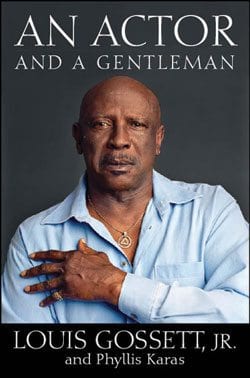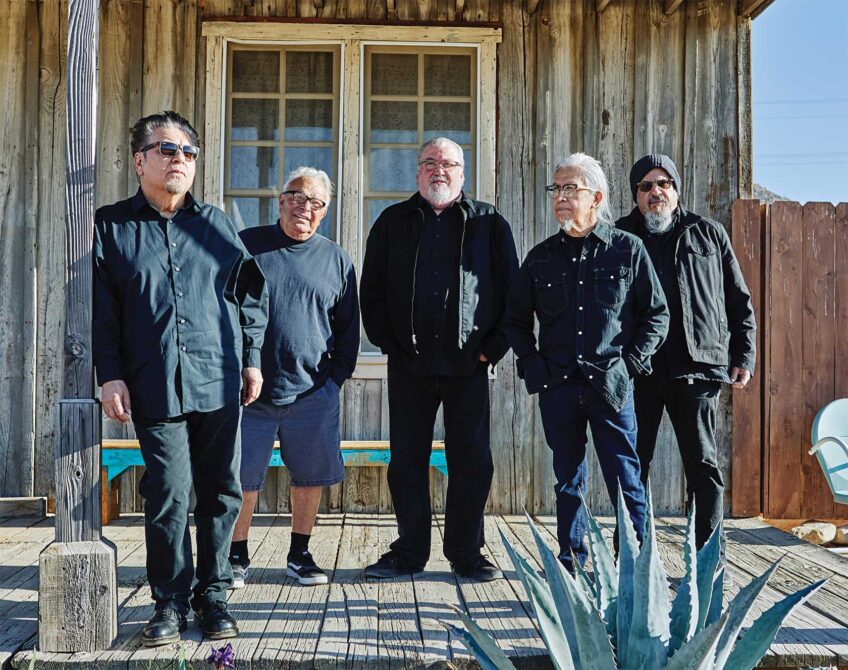
Louis Gossett, Jr. knows a thing or two about Hollywood; his autobiography shares many of those personal stories
In his autobiography, “An Actor and a Gentleman,” Louis Gossett, Jr. summons his great-grandmother, Ms. Bertha, into being with a story about her waving a smashed finger at him for being a cocky teenage boy. Ms. Bertha, who lived to 112 years old, had gotten her finger smashed by a wagon wheel as a child while avoiding a stampede of slaves who had just learned that they were free. Calling the finger his great-grandmother’s “badge of honor,” Gossett is one of very few African Americans living today who actually met a former African American slave.
Among the other topics discussed in his autobiography is the deep awareness of the blatant attacks on black men in Los Angeles and the prejudice within the Hollywood film and television industry. He also talks about coming to terms with addiction and fear, and finally launching the Eracism Foundation to counter racism, ignorance and violence.
Best known for his Emmy-winning characterization of “Fiddler,” the slave in the African American historical drama “Roots,” Gossett’s acting career began at the age of 17, when he played opposite Sidney Poitier and Ruby Dee in Lorraine Hansberry’s “A Raisin in the Sun.”
His next role would be as a leading actor on the TV movie, “Companions in Nightmare.” He has starred in dozens of films and has won numerous awards including an Academy Award, an NAACP Image Award and a Golden Globe Award for his role as Gunnery Sergeant Emil Foley in “An Officer and a Gentleman,” which co-starred Richard Gere.
With close to 60 years of experience in the Hollywood film and television industry, Gossett has a lot to say about his journey in “An Actor and a Gentleman,” which he wrote to set the stage for what he calls “the fourth quarter” of his life.
Mr. Gossett, how does it feel to be the first African American person to win something in a category? Because of people like you, fewer of us will be the first.
Well, we just recently got the first African American president.
That’s true.
So you can never think about never. You’ve got to keep an open mind, and don’t worry about being the first person this, first person that — just do your thing. I never thought about being the first African American anything. I just had an aspiration and I had to get rid of the blocks to it. Remove all the things that kept me thinking that I could not reach it. I just had to get rid of all of those, and after that the sky was the limit.
How did you get rid of them?
There are certain things you need to do. You need to pray. You have to look at things that are keeping you from doing that; and get rid of those fears — fears are major! It’s a major block of the inspirations and aspirations of doing anything. Especially when you come from a certain area, and you don’t see anybody else making it. I just did a movie, a very good quality movie, and Sony’s going to put it out. It’s called “The Lamp,” and the story is about this couple that lost their child and they blame themselves. And one of the themes in the movie is that sometimes the lot of us lose sight of what the truth is because of television or society or the places we live, and we begin to embrace the lie. Slowly but surely we start to believe that lie, and then that lie slowly becomes the truth. Then we look up one day and our whole life has been based around that lie.
Your new book talks being a black man in Hollywood. Can you say more about that and how it affected part of your struggle? Can you talk about Hollywood today? Is it the same today?
It’s developing I think as fast as it’s supposed to develop. But Hollywood is primarily Caucasian, and those particular people were taught what they were supposed to do and are making stories about their particular experience. On the periphery are Latinos, and Asians, and blacks. But our country is not like that; our country is full of everybody. The message that gets on the screen makes young people think “Well, we must not have done anything, so we’re never going to aspire to that.”
My advice is that Hollywood is tough and even [our best black actors] who have worked beautifully and who are making a great deal of money are high paid employees rather than the ones calling the shots. That’s why television and the image on major screens is predominantly — still predominantly — Caucasian because that’s the way it’s been. It’s now time to fix that up.
Do you feel that there are some current shows that are at least trying to make a difference?
“[The] Closer” is a perfect example. “Closer” is a wonderful show, and it’s number one. We should take the lesson of what “Closer” has done. There’s another one, “The Event,” where Blair Underwood is the President of the United States. So slowly but surely, the young people are getting it because they’re taking over.
Seems like most of the people who have gained success did so because they took it.
That’s right. Just take it, without resentment and anger, and do the best job so that you’re memorable. And keep on proving that we need each other; we’re one family in this world, and we should behave the way we would want the world to be even if we’re the only one in the room doing it.
Have you thought about the impact of the movie “Roots” and its effect on generations and generations of people? Have you thought about your involvement in this film and felt proud to have had such an experience?
I am very proud of having participated in “Roots” and getting that Emmy. But a very funny thing happened after “Roots” was brought throughout the nation: open employment for African American actors went down.
Why do you think that happened?
It’s a guess, an educated guess that there was a worry there for a minute. It’s almost the same worry, but not as large, as when Lincoln said “I’m going to free the slaves” and people in the South were like “Are you out of your mind?” (Laughs) We’ve trained these people. We’ve made them the best that they could possibly be, but they are our charge, they are our industry. Now we’ve got them in the best condition and now you want to free them? You must be crazy! They’re going to take over! (Laughs)
Interesting way of seeing it.
But that’s a lie, and we’re just going be cold-blooded Americans. Embrace the lie and that’s what happens. Like our president; that’s the difficulty our president is having. So they can all embrace this lie, and they’re afraid that once this one comes out that too many other blacks are going to get into it and change things — well they’re going to change whether we like it or not. We just need to enjoy the fruits of our labor together.
Well, that sounds very optimistic.
Well you have to look at it as not so much optimistic as it is necessary. That’s what I’m working on through my Eracism Foundation. The goal is to encourage young people to listen to these lessons, and get out of what they think is impossible — there’s no such thing as impossible. We know that in sports, in all kinds of sports. We know that in music. Young people need to know the basics.
What are the basics?
They’re simple: respect, respect for your elders, respect for the opposite sex, your dress code, your hygiene, your physical fitness, your conflict resolution, and your aspiration to be as good a person and citizen of this world as possible. And you give in order to get.
You’re about to set off a revolution.
Some people call it a revolution, but it’s an evolution.






